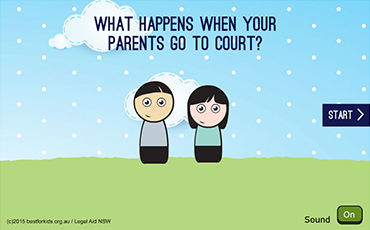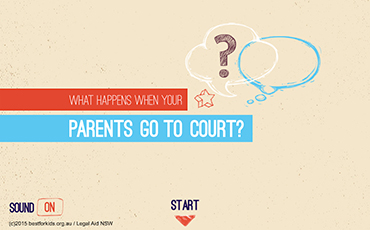 When Families Separate
When Families Separate
It's really hard for everyone when parents separate - especially kids. Sometimes when parents cannot agree, the family courts will appoint a lawyer for the kids called the Independent Children's Lawyer. You will find information about this and other topics here.
The featured video explains the role of the Independent Children's Lawyer. You can watch the interactive brochures for more information about Independent Children's Lawyers. The coloured speech bubbles and links at the bottom of the page have more information about family separation, legal stuff and helping you cope.
Independent children's lawyer for kids
Captions:
Boys and girls from diverse backgrounds talk to the camera with questions about the ICL.
Girl 1:Why do I have to have a lawyer?
Girl 2:Where do I see the lawyer? And who will be with me?
Boy 1:Does the lawyer decide what's going to happen to us?
Boy 2:My mum says it's the judge who decides. Is that right?
Girl 3:Will the children's lawyer do what I tell them?
Boy 3:I know what I want although I don't want to hurt mum or dad's feelings.
Boy 4:I just worry about saying the wrong thing.
Girl 4:Yeh. Like whose side is the lawyer on?
Meet the Independent Children's Lawyer (the ICL)
The ICL is talking with background of the courtroom and interviewing kids in the ICL interview space.
Independent Children's Lawyer (ICL) (to camera):Wow. That's a lot of questions! Ok. Lets see if I can help! I'm Jackie and I'm an Independent Children's Lawyer. Independent means that I don't take sides. I'm not mum's lawyer or dad's lawyer.
But if mum and dad go to court – sometimes the Court decides that the kids need a lawyer too. And my job is to help the Court decide what's best for the kids.
So what I do is talk to the kids about their lives. And I also talk to teachers, doctors and psychologists and find out stuff that helps me understand more about you.
Int. Family Court - Day
The ICL is in a Court Room. She talks to the camera in an upbeat style of a kids' lifestyle or music show. As she talks the parents and their lawyers come into court.
ICL (to camera):Ok, let's set the scene. Mum and Dad go to Court; arguing over parenting details. Where the handover should be, going to Nan's for your school holidays, that sort of stuff. And of course who you're going to live with and how much you will see your other parent.
Going to court is hard and no-one likes it. But sometimes parents have to when they can't agree.
The good thing is, kids don't have to.
The ICL is now standing near the judge's seat.
ICL (to camera):But the Judge is interested in you. They sit up at the front here.
The judge 'magically' appears in the seat.the ICL is a little startled.
ICL (to judge):Oh. Excuse me your Honour.
The judge responds as though there is nothing unusual.
Judge (to ICL and then to the camera):Carry on Ms Kline. I'm sure your audience are very keen to hear more...
ICL (to judge):Yes your honour. Thank you, your honour.
ICL steps away a little further from the judge and continues.
ICL (to camera):The judge is interested in what's best for you.
And they listen to what everyone says about that.
As the ICL points out the bar-table and area behind it, we see various characters appear as she refers to them. (mum, dad and their respective lawyers).
ICL (voice):The judge listens to mum and dad or their lawyers if they have one.
ICL takes her place at the bar table between the other to lawyers. the court scenes continue...
ICL (to camera):And the judge also listens to me. Its my job is to make sure the Judge knows lots about your situation before making a decision.
When a judge decides on what should happen – they make an Order. An Order is a serious legal decision and everyone - Mum and Dad and you – have to do what the judge says - about where you live, how much time you'll spend with mum and dad, and?handovers - all the stuff that your folks have been arguing about.
Everyone except the ICL dissolve back out of the courtroom. She is alone again with her audience.
ICL (to camera):So let me answer some of those tough questions:
Boy 2:My mum says it's the judge who decides. Is that right?
Family Court background and background of dad bringing kids to the ICL interview - Day
ICL (to camera):The judge will decide – only if mum and dad can't agree. Sometimes mum and dad do agree before they go to court. Its part of my job is to help them reach an agreement - by making sure your parents focus on you and what you need. So I can talk to them or their lawyers and explain a plan I think is best for you –Sometimes they both agree. But if they don't then – yes the judge will decide.
Girl 3:Will the children's lawyer do what I tell them?
Family Court - Day
ICL (to camera):No. But we listen to your feelings and make sure that the Judge knows what you want.
And try not to worry about what to say or what you think mum or dad might want you to tell me.
Because I'm more interested in the day-to-day things; a day in a life of you! Like school and sport and friends and what you like doing with mum and what you like doing with dad. So I can begin to think what's best for you.
But what you tell me is only part of the story. I talk to lots of people and read lots of stuff – to help the judge decide.
Girl 2:Where will I see the lawyer and who will be with me?
Family Court and the Independent Children's Lawyer's office waiting room - Day
ICL:That's an easy one. Usually, we meet in my office. It takes about an hour. Mum or Dad wait outside while we're talking.
Boy 3:I know what I want although I don't want to hurt mum or dad's feelings
Boy 4:I just worry about saying the wrong thing
Family Court - Day
ICL:Your views are only one thing that the Judge thinks about when they to decide. They also listen to your parent's opinions and what other people who know you have said. So please don't worry about saying the wrong things.
Time for one more question.
Girl 2:How will I know when the case is finished?
Family Court - Day
ICL:The case finishes when mum and dad agree on a plan that's best for you - or the Judge makes a decision about what's best. When that happens I will arrange to see you and explain what's been agreed.
---END---
END NOTES:
This story and the characters in it are made-up and not based on any actual people or their situation.
For more information about this video visit www.bestforkids.org.au
The information in this video is a general guide to the law. It should not be relied on as legal advice and it is recommended you talk to a lawyer about your particular situation. At the time of production, the information shown is correct but may be subject to change.
If you need legal help or referral contact: LawAccess NSW on 1300 888 529 or www.lawaccess.nsw.gov.au.
Copyright Legal Aid NSW August 2011.
Produced by eegenda.
Click on a topic to see more information

Your Feelings
It can be really confusing for kids when families break up.You might be feeling many different emotions and don't understand why. We've gathered lots of information to help you.
-
Questions and Answers about Separation for Children answers lots of your questions.
-
Reachout has on-line resources and contacts for teenagers.
-
Headspace - This site has information to help you through tough times.
-
Beyond Blue This site can help you understand your feelings
Independent Children's Lawyer
Often parents can reach agreement after going to mediation but if they can't, the Court will appoint a kids' lawyer called the Independent Children's Lawyer (ICL).
Our featured video explains the role of the ICL for you.
-
ICL - for kids has information about the role of the ICL.
-
Sometimes kids (and families) will be referred to see a Family Consultant.
- Why am I going to see a Family Consultant? has information for kids aged 5-8.
- Why am I going to see a Family Consultant? has information for kids aged 9-12.
-
What happens when your parents go to court? Interactive brochures about the role of the ICL:
Your Rights
The Independent Children's Lawyer is appointed to make sure that the Court knows your views and they tell the Judge what they think is the best result for you. If you see a Family Consultant you can also talk to them about what you want. See fact sheet for younger kids and for older kids.
-
What if you are unhappy about your Independent Children's Lawyer? If you have a problem, it is always best to talk about it with the person you are dealing with. The Legal Aid NSW website has more information about complaints.
-
What happens when your parents go to court? Interactive brochures about the role of the Independent Children's Lawyer:
The Law
When families separate, arrangements for the kids are sometimes decided between the parents alone and sometimes with the help of a Judge or Federal Magistrate at the family law courts.
When parents can't agree, the main thing the Judge or Federal Magistrate will think about before making a decision is what's best for the kids.
-
Youth Law Australia has lots of legal information for kids and young people.
-
Family Law Courts for Children - You'll find helpful information from the Family Law Courts here.
It can be really confusing for kids when families break up.You might be feeling many different emotions and don't understand why. We've gathered lots of information to help you.
Questions and Answers about Separation for Children answers lots of your questions.
youth.csa.gov.au
You'll find books, games and activities about separation here.
reachout.com has on-line resources and contacts for teenagers.
Often parents can reach agreement after going to mediation but if they can't, the Court will appoint a kids' lawyer called the Independent Children's Lawyer (ICL).
Our featured video explains the role of the ICL for you.
- ICL - for kids has information about the role of the ICL.
-
Sometimes kids (and families) will be referred to see a Family Consultant.
- Why am I going to see a Family Consultant? has information for kids aged 5-8.
- Why am I going to see a Family Consultant? has information for kids aged 9-12.
-
What happens when your parents go to court? Interactive brochures about the role of the ICL:
When families separate, arrangements for the kids are sometimes decided between the parents alone and sometimes with the help of a Judge or Federal Magistrate at the family law courts.
When parents can't agree, the main thing the Judge or Federal Magistrate will think about before making a decision is what's best for the kids.
Lawstuff has lots of legal information for kids and young people.
Family Law Courts for Children
You'll find helpful information from the Family Law Courts here.
The Independent Children's Lawyer is appointed to make sure that the Court knows your views and they tell the Judge what they think is the best result for you. If you see a Family Consultant you can also talk to them about what you want. See fact sheet for younger kids and for older kids.
What if you are unhappy about your Independent Children's Lawyer? If you have a problem, it is always best to talk about it with the person you are dealing with. The Legal Aid NSW website has more information about complaints.
Helpful Links
- Family Law Courts for Children
You'll find helpful information for kids from the Family Law Courts here. - Kids Helpline 1800 55 1800
This site for young people has info about family separation. There is help for kids and for teens. You can also call the helpline for free on 1800 55 1800 or contact them online.
For kids click here
For teens click here - Reachout is an online youth mental health service that provides info, tips and strategies for dealing with issues, as well as chat forums and links to other services. There is a page on dealing with custody arrangements, including how to cope and get the help you need.
- Headspace is a youth mental health site, for young people and their carers, which provides support, info, real-life stories and practical advice about getting your life back on track after a tough time.
- How to cope when your parents separate This site from South Australia Health provides some helpful info on how it might feel when your parents split up, what you can do about it and what might come next.
- Family Law Courts Find out about how the family courts work, the people involved and answers to other questions . This Federal Circuit Court site has info for 5-8 year olds and for 9-12 year olds, and for teenagers including a video about the special lawyers who represent young people in family matters.
- Independent Children's Lawyer - for kids has information about the Independent Children's Lawyer.
Useful Publications
- Questions and Answers about Separation for Children has commonly asked questions about family separation.
- Why am I going to see the Family Consultant? This site has information for kids aged 5-8.
- Why am I going to see the Family Consultant? This site has information for kids aged 9-12.
- What happens when your parents go to court? These brochures provide information on the role of the lawyers who represent children when their parents are going to court (known as Independent Children's Lawyers). The info includes what sort of things these lawyers need to know, what they will tell the court about you and your situation, and how your relationship with them will work. There is a brochure for children and one for teenagers.
For under 10 years old
For over 10 years old
Other Videos & Resources
- What happens when your parents go to court? These brochures provide information on the role of the lawyers who represent children when their parents are going to court (known as Independent Children's Lawyers). The info includes what sort of things these lawyers need to know, what they will tell the court about you and your situation, and how your relationship with them will work. There is a brochure for children and one for teenagers.
For kids under 10 years old
For kids over 10 years old


